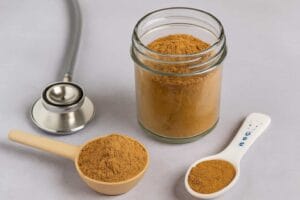Chronic pain affects millions worldwide, often leading to a diminished quality of life and reliance on medications with unwanted side effects. In the search for natural remedies, Reishi Mushroom for Reducing Chronic Pain has gained attention for its potential therapeutic properties. Known traditionally as the “mushroom of immortality,” Reishi has been used in Eastern medicine for centuries. Today, scientific research and anecdotal evidence suggest that this powerful fungus may offer a natural way to ease persistent pain and inflammation. If you’re curious about how this ancient remedy could fit into your wellness routine, read on to explore its benefits, mechanisms, and practical uses. For those interested in its broader health effects, check out our detailed article on Reishi Mushroom for Skin Health.
The Science Behind Reishi Mushroom for Reducing Chronic Pain
Reishi mushroom (Ganoderma lucidum) contains a variety of bioactive compounds, including triterpenoids, polysaccharides, and peptidoglycans, which contribute to its health-promoting effects. These compounds have been studied for their anti-inflammatory, antioxidant, and immune-modulating properties — all crucial factors in managing chronic pain.
Chronic pain often results from ongoing inflammation or nerve sensitization. Reishi’s anti-inflammatory actions help reduce the release of pro-inflammatory cytokines, which are signaling molecules that exacerbate pain. Additionally, its antioxidants combat oxidative stress, a contributor to tissue damage and chronic pain conditions.
| Key Compound | Primary Benefit | Relevance to Chronic Pain |
|---|---|---|
| Triterpenoids | Anti-inflammatory and analgesic effects | Reduces inflammation and pain signaling |
| Polysaccharides | Immune system modulation | Supports immune balance, reducing chronic inflammation |
| Peptidoglycans | Antioxidant properties | Protects tissues from oxidative damage linked to pain |
How Reishi Mushroom Supports Pain Management Naturally
One of the most compelling reasons to consider Reishi Mushroom for Reducing Chronic Pain is its multi-target approach. Unlike typical painkillers that focus solely on symptom suppression, Reishi addresses several underlying contributors to pain:
- Inflammation Reduction: By lowering inflammatory markers, Reishi can ease joint and muscle pain commonly seen in arthritis and fibromyalgia.
- Immune System Balance: Chronic pain can sometimes be linked to immune dysregulation. Reishi’s ability to modulate immune responses helps restore balance.
- Stress and Fatigue Relief: Chronic pain often coexists with stress and exhaustion. Reishi’s adaptogenic properties help the body cope with stress, potentially reducing pain perception.
- Improved Sleep Quality: Pain can disrupt sleep, which in turn worsens pain sensitivity. Reishi is known to promote restful sleep, creating a positive cycle of recovery.
For those managing other health concerns alongside chronic pain, such as blood pressure, mushroom supplements may offer multiple benefits. Explore our guide on Mushroom Capsules for Maintaining Healthy Blood Pressure to learn more about the holistic advantages of medicinal mushrooms.
Practical Ways to Incorporate Reishi Mushroom into Your Pain Management Routine
Reishi mushroom is available in several forms, making it accessible and easy to include in your daily regimen. Here are some popular options:
- Reishi Tea: Traditional and soothing, Reishi tea is made by simmering dried mushroom slices or powder. It’s a gentle way to enjoy the benefits over time.
- Capsules and Supplements: Concentrated extracts in capsule form provide a convenient and standardized dose, ideal for consistent use.
- Tinctures: Liquid extracts absorbed quickly and can be added to water or juice.
- Powdered Form: Easily mixed into smoothies, coffee, or recipes for those who prefer a versatile approach.
When choosing a supplement, quality matters. Look for products sourced from reputable growers that use organic cultivation methods and standardized extraction processes to ensure potency and safety.
Potential Side Effects and Considerations
While Reishi mushroom is generally well-tolerated, some individuals may experience mild side effects such as dry mouth, dizziness, or digestive upset. Because it can affect blood clotting and immune function, it’s important to consult a healthcare professional before starting Reishi, especially if you are on blood thinners, immunosuppressants, or pregnant.
Integrating Reishi mushroom for reducing chronic pain should be part of a comprehensive pain management plan that includes lifestyle changes, physical therapy, and medical guidance where necessary.
F.A.Q
-
What makes Reishi mushroom effective for reducing chronic pain?
Reishi mushroom contains bioactive compounds like triterpenoids and polysaccharides that reduce inflammation and modulate the immune system, both of which play key roles in chronic pain. These actions help alleviate pain at its source rather than just masking symptoms.
-
How long does it take to notice pain relief from Reishi mushroom?
Results can vary depending on the individual and the severity of pain. Some people report improvements within a few weeks, while others may need consistent use over several months. Patience and regular intake are important for experiencing the full benefits.
-
Can Reishi mushroom interact with medications?
Yes, Reishi mushroom can interact with certain medications, particularly blood thinners and immunosuppressants. Always consult your healthcare provider before adding Reishi to your regimen to avoid potential interactions.
-
Is Reishi mushroom safe for long-term use?
Generally, Reishi is considered safe for long-term use when taken at recommended doses. However, monitoring by a healthcare professional is advisable, especially for individuals with underlying health conditions or those taking other medications.
-
Where can I learn more about Reishi Mushroom for Reducing Chronic Pain?
For a comprehensive understanding of how Reishi mushroom may help with chronic pain and other health benefits, resources like Healthline’s detailed guide provide evidence-based insights. You can also explore our article on Mushroom Capsules for Blood Sugar Regulation to see how medicinal mushrooms support overall wellness.



